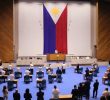
Social Security System (SSS) office in Ilustre Street, Davao City (davaotoday.com file photo)
DAVAO CITY, Philippines—To strengthen and expand its membership, the state-run Social Security System is eyeing to implement a mandatory membership for overseas Filipino workers.
On Monday, SSS President and Chief Executive Officer Emmanuel F. Dooc said the shift to mandatory OFW coverage is one of the provisions of the proposed charter amendment the pension fund is pushing in the legislative stage.
“Our objective is not just to strengthen enforcement of compliance for the coverage of employers and employees in the private sector, but also to encourage self-employed individuals and voluntary members like OFWs to register and be active in the system” he said.
In order to achieve such goal, Dooc said the agency has asked the help of lawmakers to implement the mandatory coverage of OFW.
He said this would increase “the number of members of the pension fund on the back of SSS’ efforts for universal coverage.”
“We are pushing for our OFWs to be covered on a mandatory basis in order to secure their basic safety net in time of contingencies. Their SSS contributions is essentially a form of long-term savings for the future, especially when they decide to return home and retire,” he explained.
In 2016, OFW statistics stood at 2.4 million, according to the Philippine Statistics Authority. Of this number, about 20 percent only were paying-members of the SSS or about 500,000 OFWs, with contributions reaching P4.64 billion.
“This number, however, represents only 13 percent of the estimated 3.84 million Filipinos working on temporary status abroad, as per latest data of the Commission on Filipinos Overseas,” the SSS official said.
Meanwhile, SSS has disbursed P779 million in benefits to OFWs in 2016. These include initial and lump sum benefits for retirement, death, (funeral with grant) and disability, and short-term benefits for sickness and maternity (for female workers).
He explained that Filipino migrant workers are often excluded from coverage under the social security schemes of their host countries, whose applicable laws and regulations provide only for the protection of their own nationals.
“Even those OFWs covered by their host countries may also end up not being entitled to social security benefits, or entitled but with significant reduction in amounts, because they cannot satisfy the long qualifying periods or the strict residency and immigration rules imposed by their schemes there,” Dooc added. (davaotoday.com)










